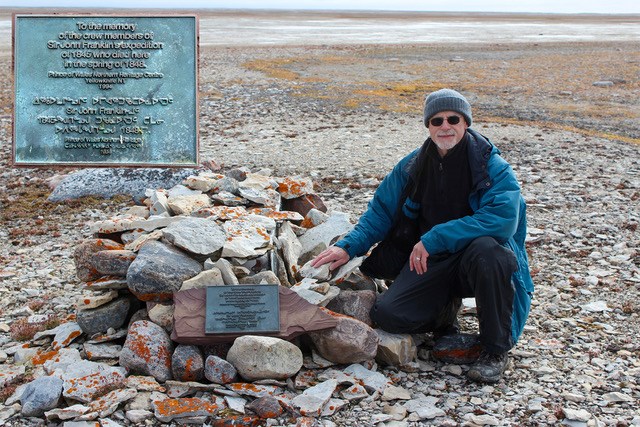THUNDER BAY — Researchers at Lakehead University's Paleo-DNA lab have played a key role in the identification of a senior officer with Sir John Franklin's ill-fated 1845 expedition to find the Northwest Passage.
The skeletal remains of James Fitzjames, the captain of HMS Erebus, were identified by a team from the University of Waterloo and at Lakehead using DNA and genealogical analyses.
In April 1848, Fitzjames helped lead 105 crew members from Franklin's ice-trapped ships in an effort to escape the Arctic, but none survived.
Since the mid-19th century, the remains of dozens of the sailors have been found around King William Island in Nunavut.
Researchers have now matched a DNA sample from a living descendant of Fitzjames with DNA that was found at an archaeological site where the bones of at least 13 crew have been discovered.
"We worked with a good quality sample that allowed us to generate a Y-chromosome profile, and we were lucky enough to obtain a match," said Stephen Fratpietro, technical manager at the Centre for Analytical Services Paleo-DNA Laboratory at Lakehead University.
Fitzjames is only the second of the 105 crew to be positively identified, joining warrant officer John Gregory, an engineer aboard Erebus, whose remains were confirmed by the same research team in 2021.
Douglas Stenton, adjunct professor of anthropology at the University of Waterloo, said, "The identification of Fitzjames' remains provides new insights about the expedition's sad ending."
Inuit told searchers in the 1850s that they had seen evidence of cannibalism among the crew members, a story that shocked Europeans.
In 1997, it was corroborated by the late bioarchaeologist Anne Keenleyside, who found cut marks on almost one-quarter of the bones discovered at King William Island.
Fitzjames' jawbone is one of those with multiple cut marks, demonstrating that he was cannibalized after death.
"This shows that he predeceased at least some of the other sailors who perished and that neither rank nor status was the governing principle in the final desperate days of the expedition as they strove to save themselves," Stenton said.
A news release Tuesday from the University of Waterloo noted that 19th-century Europeans believed all cannibalism was morally repugnant but that researchers now understand much more about what is known as survival-or-starvation cannibalism and can empathize with those forced to resort to it.
"It demonstrates the level of desperation that the Franklin sailors must have felt to do something they would have considered abhorrent," said U of W anthropology professor Robert Park.
"Ever since the expedition disappeared into the Arctic 179 years ago there has been widespread interest in its ultimate fate, generating many speculative books and articles, and most recently a popular TV miniseries which turned into a horror story with cannibalism as one of its themes.
"Meticulous archaeological research like this shows that the true story is just as interesting, and that there is still more to learn," Park said.
The remains of Fitzjames and the sailors who perished with him are resting in a memorial cairn on King William Island.
Stenton is interested in hearing from descendants of other members of the Franklin expedition to find out if their DNA could be used to identify other members of the expedition.
In September 2014, an expedition led by Parks Canada located the wreck of HMS Erebus 80 km south of King William Island, while the remains of Franklin's HMS Terror were found farther north two years later.
NOTE: Identification of a Senior Officer from Sir John Franklin's Northwest Passage Expedition by Stenton, Fratpietro and Park was published in the Journal of Archaeoogical Science Reports. The research was funded by the Government of Nunavut and the University of Waterloo.
